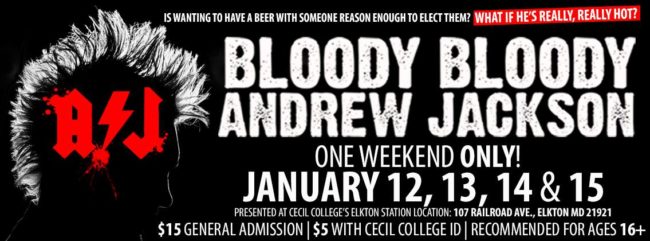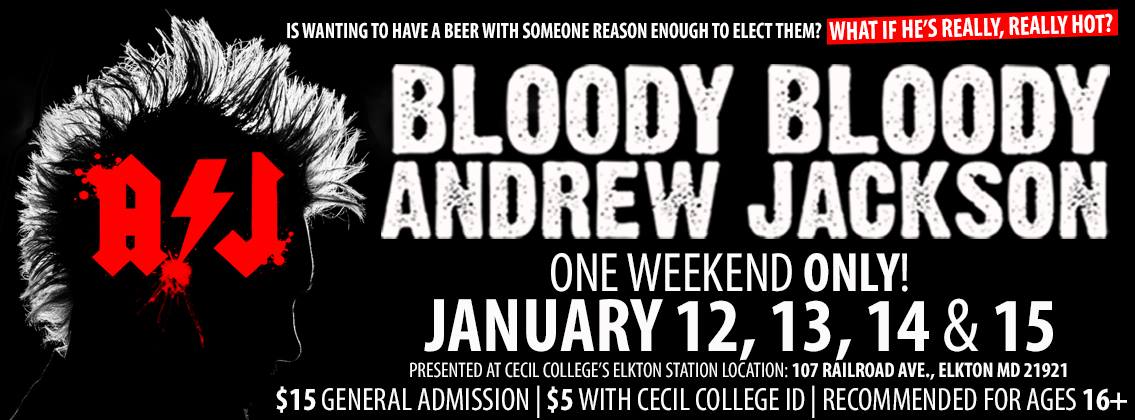Milburn Stone Theatre live at Elkton Station are the people who make things happen! Sometimes with guns, sometimes with speeches, sometimes with other things too— like their current production of Bloody, Bloody Andrew Jackson, running a one-weekend only performance to kick off the 2017 season. At a time when political satire could not be more important and more revered, Director Andrew Mitchell and Musical Director J. Andrew Dickenson come together to put the people of <19th Century> America on notice. Andrew Jackson is the people’s president and he is going give the people exactly what they asked for! Spun from the fabric of history, with Music and Lyrics by Michael Friedman and Book by Alex Timbers, this frightening examination of America’s bloodies president— America’s own personal Hitler— is shockingly similar to the current political unrest in Washington DC. Milburn Stone Theatre at Elkton Station is putting a message out there: history repeats itself and here’s the proof live in living color.

Resident Scenic Designer Bob Denton keeps the set simplistic. This best serves both the cast and the musical as it enables the story— in all its unfettered and unapologetically brutal glory— to become the central focus of the show. Flavoring the edges of the performance with something akin to revolting rock style, Costume Designer Lindsay Ellis crafts a crude sartorial selection, intentionally designed to look rebellious and stand out from the more reserved and polished suits of the socially acceptable politicians featured in the production. While the grunge-ridden outfit featured on Andrew Jackson himself isn’t terribly over the top, Ellis’ decision to keep this somewhat simple allows that additional coat of grime that is smeared over the surface of the character to come from the actor rather than a lurid layer of fabric.
Michael Friedman’s lyrics lend itself to the atmosphere of a mosh-pit rock concert gone wrong. Lighting Designer Bevin Hensley hones in on that verve and really gets the light show going in a few of the more up tempo growling group numbers. With those dizzying and almost violent swirls of colored lights that sweep around the stage and out through the house like a rave gone wrong, Hensley’s design informs the emotional cadence of the musical numbers as they unfold. This too is true of her more subtly designed moments, including faded and muted blues every time the Jackson character drops into a more sincere or emotionally grounded moment.
Featuring a live rock band on stage, led by talented Musical Director J. Andrew Dickenson, whose live guitar solo during “Second Nature” is strikingly profound, the musical vibe of the show is electrifying and perfectly suited for the overall vein of the show. Dickenson does an exceptional job of balancing the pit, himself and a drummer, pianist, and bassist, to keep that rich rocker score from overplaying and drowning out the live performers. This a delicate task that speaks volumes about his ability to understand the show’s music and the people he is commanding in his live-featured pit.
One might not expect Bloody, Bloody to have a tremendous opportunity for dancing, but Choreographer Dane Hutchinson finds ways to flip that expectation on its ass. The downside to Hutchinson’s choreography is not that it’s not clean or exciting, but rather the limited stage space in which he chooses to execute it. There is an extension platform at the front of the stage, which would give the ensemble— particularly during the final dance-out number— much more space to fully live into the brilliant moves Hutchinson has crafted. (The platform does, at times, get used to facilitate other scenes, that do have furnishings, so this may require an examination of Director Andrew Mitchell’s blocking.) The only other fault, if one can call it that, in Hutchinson’s choreographic approach to the show is that there simply isn’t enough of it. Because of the vigorous energy and enthusiasm with which the dance routines that are present are executed, it leaves the audience desiring more and there are moments where it almost feels like there could be lengthier segments or moments that could burst into dance.
There is no denying that Alex Timbers’ book is tricky. The balance of scenes to musical numbers is misappropriated and askew at best. That’s not to say that the writing isn’t good or that it doesn’t give a raw and unapologetically brutal glance into America’s bloody past under the regime of Jackson. Director Andrew Mitchell does a decent job at trying to find a cohesive flow as scene moves into song into scene and vice versa, but ultimately the pacing of the spoken scenes drags. This feels contradictory to the show’s overall pacing, which ends up being quite tight, and what the spoken scenes lack in momentum, the musical numbers make up for in tempo and enthusiasm. Overall, Mitchell handles the irreverent and intentionally offensive piece of musical theatre with great aplomb, giving it a vibrant life which is surprisingly relevant in this very moment of our American existence.
Mitchell’s strong suit is best shown in his casting choices and utilization of the ensemble as a whole. Pulling a quartet of femme fatales together for “The Corrupt Bargain”, which works out to be a cute scamper and patter number, Mitchell features Jess Simonson, Marion Jackson, Amy Tucker, and Mackenzie Brockmeyer in this number and utilizes them earlier in “Ten Little Indians”, a haunting and unsettling number which features both Brockmeyer and Tucker as striking soloists. The pair have stoic and gut-wrenching emotional threads through their solos and it calls harrowing attention to the lyrics that they are singing. Marion Jackson, who also plays little Lyncoya in addition to lending her voice to both of these quartet moments, is a spunky performer and really imbues the character with a radical energy worth noting.
Other performers in the ensemble who hone in on the comedy of the backstory and overall character work include the quartet of congressmen (three men and Emily Jewett who doubles as the Storyteller among other things and is particularly uproarious and amusing as said narrative figure.) Zachary Johnson is a hysterical hoot with his flamboyant and foppish ways as Martin Van Buren, especially with the Twinkies and his uncontrollable laugh. Ryan Milliner, who appears in congress as John C. Calhoun— but should be noted for his vocal affectations as various characters and his wild ability to patter following “Illness as a Metaphor”, which he shares with Black Fox (Alex VanderLek) as well as the title character and his romantic interest. Milliner, Johnson, and Charlie Johnson (playing Henry Clay but more notably ‘boy’ when he comes in to announce various and sundry, and the whiny John Q. Adams during “Corrupt Bargain”) all have decidedly strong and fluid voices well suited for singing.
VanderLek gets his moment in the honest cold spotlight (which it must be mentioned that Spot-Op Melissa Redfield is spot on with all of her follows) as Black Fox when he takes to singing “Second Nature”, arguably one of the most heartbreaking songs in the piece. This comes on the heels of Andrew Jackson’s heavier number, “The Saddest Song” and is par for the course when it comes to reverence and sincerity despite being thrown amid the highly irreverent overarching tone of the musical as a whole.
Adding a winsome and sweetly dispositioned foil to the bloody bastard, Emily Elborn as Rachel Jackson, gives the audience something delicate to enjoy amid all of the vocal gravel, emotional muck, and bloody mess that is Andrew Jackson’s characterization and storyline. Elborn, who is featured in duet with Jackson for “Illness is a Metaphor”, gives a riveting solo that showcases her vocal prowess in “The Great Compromise”, which makes up for how poorly the dialogue is written for her character. Elborn has a great bristling chemistry with the people’s president, while simultaneously showing us a more sensitive side of Andrew Jackson in her final interactions with him.
Who is he? He’s the federal Metamucil, he’s going to unclog this screwed up system. Who is he? He’s Andrew-bleeping-Jackson, that’s who! With remarkable grit and a zesty unction for the role, William Bryant takes on the titular character with rigorous angst. Though it is tempting and quite easy to play the character as one flat plane of rage, Bryant delves deep into the characters layers of revolutionary fire, bombastic anger, and repulsive recollection which fuels his deep-seeded hatred moving forward with the Indians. Blasé and irreverent to a fault, Bryant really makes the people both love and hate him. With powerful rocker vocals, and intentional hits of vocal fry at the end of phrases during “I’m Not That Guy” and “I’m So That Guy”, he fortifies the character with an unsavory grit and prickly exterior that rubs a rash on the soul just to hear it. Versatile in his character shift and vocal abilities, “Public Life” and “The Saddest Song” are moments of deep emotional reckoning that resonate true through Bryant’s voice.
It’s a hell of a show, and it’s quite eerie how very similar the entire scenario is to current day presidential politics. Milburn Stone at Elkton Station is showering their audience with a blood bath of honesty, and the warning of truth that history does in fact repeat itself.
Running Time: Approximately 1 hour and 45 minutes with one intermission
Bloody, Bloody Andrew Jackson plays through January 15, 2017 at The Milburn Stone Theater: Elkton Station— 107 Railroad Avenue, in Elkton, MD. For tickets call the box office at (410) 287-1037 or purchase them online.

